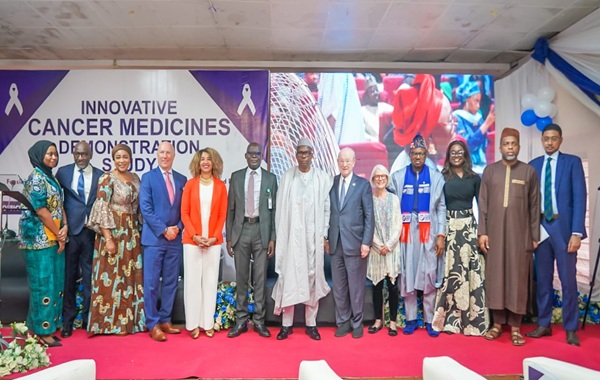Copyright thenationonlineng

Alarmed by the growing burden of colorectal cancer in Nigeria, the Federal Government has launched a groundbreaking initiative to improve access to advanced cancer treatment and reduce preventable deaths. The move follows data showing that colorectal cancer has tripled in incidence over the past four decades, now ranking as the second most common cancer in men and fourth overall in the country, causing nearly 5,900 deaths annually. Speaking at the formal launch of the Innovative Cancer Medicines (ICM) Demonstration Project on Tuesday at the National Hospital, Abuja, the Minister of State for Health and Social Welfare, Dr. Adekunle Salako, said that the initiative underscores the government’s commitment to making lifesaving innovations available to Nigerians, regardless of their income or location. “The Federal Government, under President Bola Tinubu, is determined to revolutionize cancer prevention, control, and overall management in Nigeria. “Today’s milestone represents hope that patients in low- and middle-income countries will no longer have to wait decades to benefit from the same innovations available elsewhere,” Salako declared. The project, implemented in partnership with the Clinton Health Access Initiative, the Parker Institute for Cancer Immunotherapy, Bristol Myers Squibb, and Roche, will test Nivolumab, an immunotherapy drug that helps the body’s immune system fight cancer. Nigeria’s enrollment of its first patient marks a historic moment in the country’s oncology research landscape. According to Salako, the project is not just a demonstration but proof that innovative cancer care can be delivered safely, sustainably, and locally, while generating vital data on patient experiences, system readiness, and infrastructure needs to guide nationwide expansion of advanced cancer care. The Minister said the effort aligns with the National Cancer Control Plan and the Renewed Hope Health Agenda, which prioritize early detection, local research, affordable diagnostics, and access to innovative treatment. He disclosed that six regional cancer centres of excellence have been built, with three already commissioned, and that the 2025 national budget contains the highest-ever allocation for cancer infrastructure. Beyond treatment, he said the government is also focusing on prevention through lifestyle modification campaigns, immunization against vaccine-preventable cancers, and nationwide screening. Salako urged regulators to ensure timely support for research without creating unnecessary barriers and commended the National Hospital Abuja and the project partners for their commitment. Prof. Abubakar Bello, Principal Investigator of the ICM Study, said the project marks a new phase in Nigeria’s oncology landscape, designed to bridge gaps in access to advanced cancer care while generating local evidence on how African patients respond to immunotherapy. He explained that the initiative is not an experiment with an untested drug, noting, “Nivolumab is already saving lives globally, and we are demonstrating that Nigerian patients can also benefit safely and effectively.” Prof. Bello said the project, conceived in 2019 by a consortium of global partners, was initially planned for four African countries but is now being implemented solely in Nigeria after years of regulatory work. He added that Nigeria now has the capacity for local microsatellite instability (MSI) testing following Roche’s installation of advanced laboratory equipment. According to him, preliminary findings show that 43 percent of Nigerian colorectal cancer patients exhibit MSI-high markers, making them more responsive to immunotherapy. He noted that each treatment cycle of nivolumab costs about ₦9.5 million, but through the partnership, 30 patients will receive free diagnosis, treatment, and monitoring for 18 months. He added that the donated medicines and diagnostics, valued at over ₦7 billion, represent one of the largest medical donations in Nigeria’s cancer care history. Prof. Bello clarified that the ICM project “is not a clinical trial but a demonstration study designed to evaluate the feasibility, safety, and patient outcomes within Nigeria’s health system.” Dr. Kevin Marks of the Parker Institute for Cancer Immunotherapy described it as proof of a global commitment to equitable healthcare, saying, “Together, we can move closer to a world where all cancers are curable for all people”. Ms. Natania Candelario of Bristol Myers Squibb said the ICM project shows Nigeria’s readiness to deliver advanced therapies such as immunotherapy when supported with the right resources. “It highlights the country’s capacity for world-class cancer care,” she said. Dr. Funke Fashawe of CHAI described the launch as the result of five years of work to make immunotherapy available to Nigerians, “We are proud to partner with the Ministry of Health to ensure safe and effective administration of these treatments,” she said. The study’s principal investigator, Prof. Abubakar Bello, said the project marks a new era in Nigerian oncology, designed to bridge the gap in access to advanced cancer treatment while generating real-world evidence on how African patients respond to immunotherapy. “This is not an experiment with an untested drug. Nivolumab is already saving lives globally. We are showing that our patients can also benefit safely and effectively,” he said Originally conceived in 2019 by a consortium of global partners, he noted that the project was initially planned for four African countries but is now solely implemented in Nigeria after years of regulatory work. The Chief Medical Director of the National Hospital, Prof. Raji Mahmud, represented by the Chairman, Medical Advisory Committee, Dr. Isiaka Lawal, said, “This study comes as we strengthen specialties such as urology, neurosciences, and organ transplantation”



